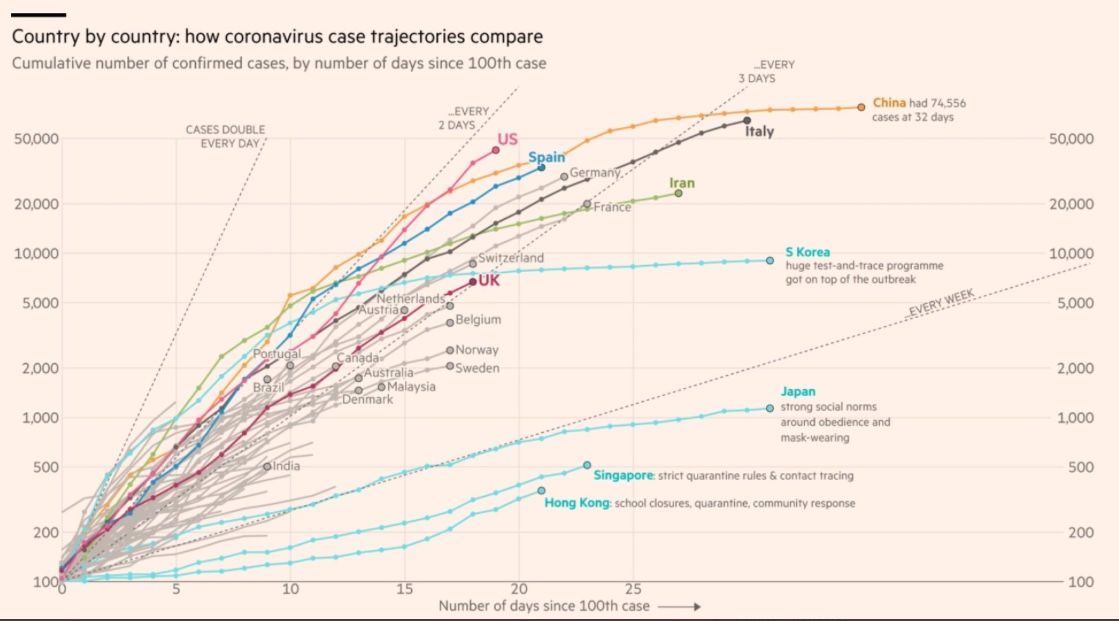COVID-19's "cone of plausibility" and how America can get it right or wrong
 Tuesday, March 24, 2020 at 12:36PM
Tuesday, March 24, 2020 at 12:36PM 
Obtained, via WAPO "The Daily 202," from here.
The "cone of plausibility" is a graphical representation of a range of plausible downstream scenarios expanding outward from today's current reality. See here for a description.
What is presented here is the exhibited reality of numerous states, indicating that most, once trapped in the coronavirus dynamic, suffer a post-first-100-cases trajectory of rough doubling of cases between every 2-3 days. That's the cone.
Those who did better? For now, they are well-run Asian democracies (Japan and ROK), where collectivism trumps individualism (at least still when in crisis), so a mixture of social self-discipline, strong governments with extensive power and reach, and a high level of trust between leaders and led.
HK and Singapore appear to fall into that category, but I never put too much stock in city-states as exemplars. The scale is just too far off. China underperforms largely because government was looking out for itself for far too long in beginning, recovering only through fairly harsh measures - all very Chinese.
The West seems clearly clustered in that 2-3-day-doubling range, with probably speed-of-response being the key differentiator. We're on the high end in US because Red America blew it off until very recently, following the lead of POTUS and Fox News. With that dynamic hopefully muted for a while as vast majority of Americans now "come to Jesus" in taking this seriously, the big question looming is, How long can we continue doing what's needed, given the economic cost?
Already the speculation rises that POTUS will feel great personal financial pressures over his suffering properties (estimated to be losing 1/2M$ per day), and, while that's true, it's also indicative of the genuine economic pain, so maybe not the worst inpulse. Still, those external economic pressures would swamp any White House, so perhaps it would have been safer to have someone in charge right now with more financial "distance" from that dynamic (i.e., a traditional president). So now we watch Kudlow-vs-Fauci, with POTUS making comparisons to auto accident deaths, etc.
That's a natural tension in any crisis: When do we get to declare it's over? Americans are not a patient lot. And yet, the stakes here couldn't be higher. Right now the percent of Americans who've lost someone is tiny, but that will expand dramatically over the next month, making all this EXTREMELY personal to those affected. Loved ones die all the time from forces we cannot tame, but, as this chart shows, we CAN tame this dynamic, given the right balance between economic and human cost. Done well, maybe 2020 feels like a "double-cancer" or "double-heart disease" year (i.e., COVID-19 kills about 600,000), but done poorly - and given all the "war" talk, maybe a 60% infection rate, coupled with a 1% kill rate (both entirely plausible estimates), leaves 2 million Americans dead. That would be a slightly higher social cost than WWII was (or 2m of 330m as just 1/2 of 1% of Americans dying from COVID-19 versus 400k of 131m dying in WWII - or roughly 1/3 of 1%).
The experential data seems very clear on this: Even with a solid effort, the average country is looking at a peak-and-decline dynamic arriving in the range of 8-10 weeks after crisis onset. That is mid-to-late May for the U.S. We are getty antsy now, half-way through Week 2, so it's hard to imagine most citizens exhibiting the necessary self-discipline for another 6-8 weeks, even as the experience of other countries makes clear that is what is required if you want a semi-normal summer (hopefully) followed by a renewed battle in the fall, but one fought on far better terms.
Done right, POTUS pulls out a huge policy/leadership win even as the economic costs pile up and possibly ruin his re-election bid. George H.W. Bush did similarly with Desert Storm and the early 90s economic slowdown, but he took his fate like the real leader he was. I am far less hopeful in this current political climate.
Point of this chart SHOULD be: we know what we have to do, the only question is whether we value lives more than money.
I know, right? How very Bernie of a moment, but also a glimpse of our collective future. We hurtle toward Kurzweil's Singularity, reflective of our collective trajectory into the Age of Biology. Access to medical care/tech is already becoming THE human rights issue of this century, and experiences like this only accelerate those dynamics. By way of comparison, America's inevitable transformation into non-white majority status seems positively retrograde in terms of ideological stakes, even as it so clearly captures the political attention of so many citizens right now.
Per the adage about not wasting any crisis, we can hope that this pandemic alters our thinking here in America, reacquainting us with the emerging reality that this is the nature of crises in today's world (system perturbations, not fantasies of returning to strategic warfare with other great powers - much less the "grave danger" of invading immigrant hordes) and redirecting us off this racially-based identity politics and back onto issues of human rights concerning fair access to emerging health technologies and the care options they offer. With the rich and famous being treated so well (Your COVID test is in, Mr. Hanks/Mr. Gobert/Senator Paul!) while front-line healthcare workers jerry-rig protective gear, this crisis presents immense potential for another populist explosion in the upcoming election - likely to be our 8th "change election" in a row!
Here's hoping we come closer to the mark on this one.
 Thomas P.M. Barnett Comments Off |
Thomas P.M. Barnett Comments Off | 








